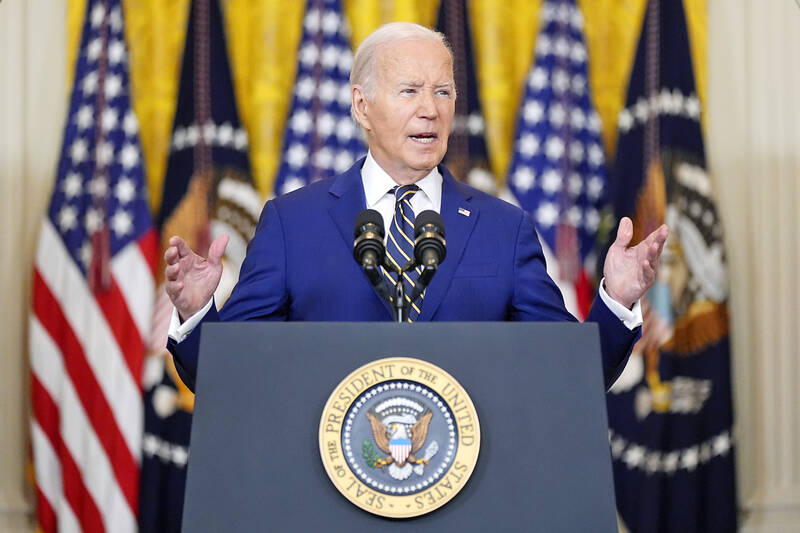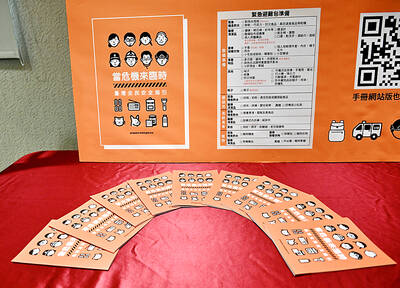US President Joe Biden said he does not rule out the possibility of using military force to defend Taiwan if China unilaterally tries to change the “status quo” across the Strait.
In an interview with Time magazine published on Tuesday, Biden said he has made clear to Chinese President Xi Jinping (習近平) that the US would not seek independence for Taiwan.
However, whether the US uses military force to help protect Taiwan would depend on whether “China unilaterally tries to change the status” across the Taiwan Strait, Biden said.

Photo: AP
If China tries to change the “status quo” unilaterally, “we’re continuing to supply capacity [to Taiwan],” Biden said. “We’ve been in consultation with our allies in the region.”
Time cited CIA Director Bill Burns as saying Xi has ordered the Chinese military to be ready to conduct a successful invasion of Taiwan by 2027.
Since he took office in 2021, Biden had said on at least four separate occasions that the US would defend Taiwan in the event of attacks by China.
On one occasion, when asked by host Anderson Cooper during a CNN town hall in Baltimore on Oct. 21, 2021, whether the US “would come to Taiwan’s defense if China attacked,” Biden replied: “Yes, we have a commitment to do that.”
In a prerecorded interview with CBS’ 60 Minutes program that aired on Sept. 18, 2022, Biden said the US would defend Taiwan “if in fact there was an unprecedented attack.”
The Ministry of Foreign Affairs yesterday thanked Biden for saying he would not rule out committing US troops to the defense of Taiwan in the event of a Chinese invasion.
Biden’s comments reflected the US’ ongoing commitment to regional peace and stability in the Asia-Pacific region, the ministry said, adding that Taiwan would continue to cooperate with the US on those efforts.
“China frequently exerts pressure on Taiwan through gray zone tactics, and this has aroused great concern in the international community,” the ministry said.
“Taiwan will firmly defend freedom, democracy and security in the region, and continue to improve its self-defense capabilities,” it added.
Separately, while speaking at a conference on national defense organized by a think tank affiliated with the Chinese Nationalist Party (KMT), party Chairman Eric Chu (朱立倫) said that Taiwan should use a two-tiered approach — seeking dialogue and exchanges with China, and strengthening the nation’s defense — to safeguard peace in the Strait.
“In addition to constantly working to defend Taiwan, we must also ease tensions and create an atmosphere conducive to exchange and dialogue,” he said.
“This is an important responsibility of both sides of the Taiwan Strait, so that Taiwan does not become the most dangerous place on Earth,” he added, referring to a report published by The Economist on May 1, 2021.
Chu also criticized President William Lai (賴清德), saying that he had “worsened tensions with China since taking office.”
Lai yesterday reiterated that he is open to dialogue and exchanges with China on the basis of mutual benefit and common prosperity, and called on Beijing to shoulder its share of responsibility for maintaining peace with Taiwan.
Lai, who is also chairman of the Democratic Progressive Party (DPP), made the statement yesterday during a meeting of the DPP Central Standing Committee, during which he addressed the discussions on Taiwan that took place at the annual Shangri-La Dialogue held from Friday to Sunday last week in Singapore.
Lai thanked participants at the meeting who expressed concern over Taiwan-China tensions.
Taiwan would continue to maintain relationships with trusted partners in the international community and deepen cooperation with like-minded countries, he said.
Taiwan’s stance on relations with China remained the same, which is to maintain the “status quo” across the Strait, he said.
“As a responsible member of the international community, we will strive to maintain peace and stability,” Lai added.
Additional reporting by Chen Yun

One of two tropical depressions that formed off Taiwan yesterday morning could turn into a moderate typhoon by the weekend, the Central Weather Administration (CWA) said yesterday. Tropical Depression No. 21 formed at 8am about 1,850km off the southeast coast, CWA forecaster Lee Meng-hsuan (李孟軒) said. The weather system is expected to move northwest as it builds momentum, possibly intensifying this weekend into a typhoon, which would be called Mitag, Lee said. The radius of the storm is expected to reach almost 200km, she said. It is forecast to approach the southeast of Taiwan on Monday next week and pass through the Bashi Channel

NO CHANGE: The TRA makes clear that the US does not consider the status of Taiwan to have been determined by WWII-era documents, a former AIT deputy director said The American Institute in Taiwan’s (AIT) comments that World War-II era documents do not determine Taiwan’s political status accurately conveyed the US’ stance, the US Department of State said. An AIT spokesperson on Saturday said that a Chinese official mischaracterized World War II-era documents as stating that Taiwan was ceded to the China. The remarks from the US’ de facto embassy in Taiwan drew criticism from the Ma Ying-jeou Foundation, whose director said the comments put Taiwan in danger. The Chinese-language United Daily News yesterday reported that a US State Department spokesperson confirmed the AIT’s position. They added that the US would continue to

The number of Chinese spouses applying for dependent residency as well as long-term residency in Taiwan has decreased, the Mainland Affairs Council said yesterday, adding that the reduction of Chinese spouses staying or living in Taiwan is only one facet reflecting the general decrease in the number of people willing to get married in Taiwan. The number of Chinese spouses applying for dependent residency last year was 7,123, down by 2,931, or 29.15 percent, from the previous year. The same census showed that the number of Chinese spouses applying for long-term residency and receiving approval last year stood at 2,973, down 1,520,

EASING ANXIETY: The new guide includes a section encouraging people to discuss the threat of war with their children and teach them how to recognize disinformation The Ministry of National Defense’s All-Out Defense Mobilization Agency yesterday released its updated civil defense handbook, which defines the types of potential military aggression by an “enemy state” and self-protection tips in such scenarios. The agency has released three editions of the handbook since 2022, covering information from the preparation of go-bags to survival tips during natural disasters and war. Compared with the previous edition, released in 2023, the latest version has a clearer focus on wartime scenarios. It includes a section outlining six types of potential military threats Taiwan could face, including destruction of critical infrastructure and most undersea cables, resulting in